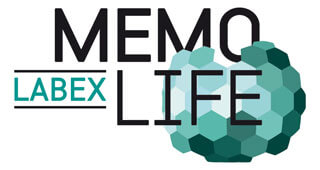LabEx MemoLife

MemoLife concern all the teams of the Institut de Biologie de l’ENS (IBENS), the Centre Interdisciplinaire de Recherche en Biologie-College de France (CIRB) and the 2 teams of the Neurobiology Unit of the Ecole Supérieure de Physique Chimie Industrielle (ESPCI).
MemoLife develop the idea that the concept of memory can be declined at all levels and deal with all aspects related to the integrated concept of memory in living systems, from the molecule to the most evolved structure such as the brain.
The objective is to develop the interactions between scientists from all biological domains and to foster, in house, multiple interactions with mathematicians, chemists and physicists with a strong interest for biological processes. Indeed following a period during which a huge amount of data have been generated, at the molecular, cellular and organ level, understanding how each level of organization is integrated in whole has become a priority. To that end, as important as high throughput approaches might be, it is obvious that we also need the active cooperation of scientists with different backgrounds and interests.
The scientific axes are:
MemoLife develop the idea that the concept of memory can be declined at all levels and deal with all aspects related to the integrated concept of memory in living systems, from the molecule to the most evolved structure such as the brain.
The objective is to develop the interactions between scientists from all biological domains and to foster, in house, multiple interactions with mathematicians, chemists and physicists with a strong interest for biological processes. Indeed following a period during which a huge amount of data have been generated, at the molecular, cellular and organ level, understanding how each level of organization is integrated in whole has become a priority. To that end, as important as high throughput approaches might be, it is obvious that we also need the active cooperation of scientists with different backgrounds and interests.
The scientific axes are:
- Genome structures, organization and evolution
- Receptors and synapses
- Neuronal and glial network dynamics
- Genes and behaviors in model systems
- Cell biology
- Development, plasticity and regeneration
- Genetics, pharmacology and physiology
Training objectives are to:
- Train master and PhD students in interdisciplinary approaches
- Reinforce the academic curricula for engineers, to provide young scientists with a culture of the corporate world, and to develop the scientific background of selected MD/PhD.
- Facilitate double curricula at the master (and bachelor) levels
- Organize summer schools and other advanced courses in Systems biology, Cellular and sub cellular imaging, Genomics and Regulatory Networks, Optogenetics, Epigenetic, Computational biology,
- Set up a common international doctoral program, in collaboration with accredited ED.
- Attract researchers by setting up new chair and give four years financial support to PhD students.
- In conclusion, this project involves teams with diverse interests and scientific cultures. Indeed, MemoLife takes its originality and strength in this diversity.
Antoine Triller, MemoLife director